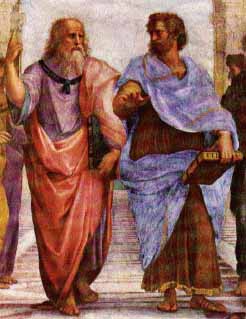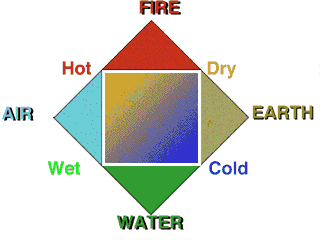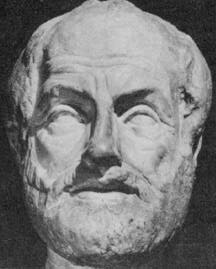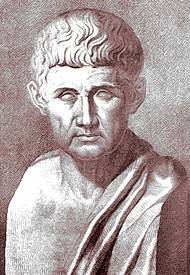Biographie
Aristoteles
(384 bis 322 vor Christus)
Aristoteles, 384 vor Christus im thrakischen Stagira geboren,
kam schon mit 18 Jahren nach Athen als Schüler Platons,
in dessen "Akademie" er fast zwei Jahrzehnte
verblieb, zuerst als Lernender, danach als Lehrender, zuletzt
mit eigener Philosophie der Ideenlehre Platons
entgegentretend.
Nach
Platons Tod (347) weilte Aristoteles eine Zeitlang zu Assos in
Kleinasien bei Hermias, einem früheren Mitschüler, der zum Fürsten
von Atarneus geworden war und dessen Adoptivtochter er
heiratete. Phillip
II., König von Makedonien, berief ihn 342 an den Hof als
Erzieher seines Alexander,
der später der Große genannt werden sollte. Nach dem
Regierungsantritt Alexanders kehrte Aristoteles nach Athen zurück,
gründete die "Peripatetische Schule" und entfaltete
in der attischen Metropole eine ausgedehnte Forschungs- und
Lehrtätigkeit, wofür ihm wahrscheinlich neben seinem eigenen
Vermögen, reiche Mittel zur Verfügung standen, die er von
Alexander erhielt. Aristoteles legte sich eine eine große
Privatbibliothek an, dazu eine naturwissenschaftliche Sammlung
mit Pflanzen und Tieren aus der ganzen damals bekannten Welt.
Zu Vergleichszwecken ließ er auch alle bekannten
Staatsverfassungen sammeln, insgesamt 158. Nach dem Tod
Alexanders war er in Athen, das sich gegen die makedonische
Herrschaft erhob, gefährdet. Er zog sich auf die Insel Euböa
zurück, wo er 322 starb.
Aristoteles
gilt als der Begründer der wissenschaftlichen Philosophie und
ihrer Einzelwissenschaften wie Metaphysik, Logik und Ethik
sowie als einflußreichster Denker für die gesamte abendländische
Philosophie.
http://www.toppoint.de/~cethegus/personen/a/aristoteles.html
Aristotle
Encyclopaedia Britannica | article page
b. 384 BC, Stagira, Chalcidice, Greece
d. 322, Chalcis, Euboea
More
than any other thinker, Aristotle determined the orientation
and the content of Western intellectual history. He was the
author of a philosophical and scientific system that through
the centuries became the support and vehicle for both medieval
Christian and Islamic scholastic thought: until the end
of the 17th century, Western culture was Aristotelian. Even
after the intellectual revolutions of centuries to follow,
Aristotelian concepts and ideas remained embedded in Western
thinking.
Aristotle's
intellectual range was vast, covering most of the sciences and
many of the arts. He worked in physics, chemistry, biology,
zoology, and botany; in psychology, political theory, and
ethics; in logic and metaphysics; in history, literary theory,
and rhetoric. His greatest achievements were in two unrelated
areas: he invented the study of formal logic, devising for it
a finished system, known as Aristotelian syllogistic, that for
centuries was regarded as the sum of logic; and he pioneered
the study of zoology, both observational and theoretical, in
which his work was not surpassed until the 19th century.
http://britannica.com/bcom/eb/article/idxref/3/0,5716,407260,00.html
Aristotle
WILLIAM TURNER
The greatest of heathen Philosophers, born at Stagira, a
Grecian colony in the Thracian peninsula Chalcidice, 384 B.C.;
died at Chalcis, in Euboea, 322 B.C.
Very little is
known about Aristotle's personal appearance except from
sources manifestly hostile. There is no reason, however, to
doubt the faithfulness of the statues and busts coming down to
us, possibly from the first years of the Peripatetic School,
which represent him as sharp and keen of countenance, and
somewhat below the average height. His character, as revealed
by his writings, his will (which is undoubtedly genuine),
fragments of his letters and the allusions of his unprejudiced
contemporaries, was that of a high-minded, kind-hearted man,
devoted to his family and his friends, kind to his slaves,
fair to his enemies and rivals, grateful towards his
benefactors -- in a word, an embodiment of those moral ideals
which he outlined in his ethical treatises, and which we
recognize to be far above the concept of moral excellence
current in his day and among his people. When Platonism ceased
to dominate the world of Christian speculation, and the works
of the Stagirite began to be studied without fear and
prejudice, the personality of Aristotle appeared to the
Christian writers of the thirteenth century, as it had to the
unprejudiced pagan writers of his own day, calm, majestic,
untroubled by passion, and undimmed by any great moral defects,
"the master of those who know".
http://www.newadvent.org/cathen/01713a.htm
Introduction
to Aristotle
Marc Cohen - smcohen@u.washington.edu
Aristotle was born
of a well-to-do family in the Macedonian town of Stagira in
384 B.C. His father, Nicomachus, was a physician who died when
Aristotle was young. In 367, when Aristotle was seventeen, his
uncle, Proxenus, sent him to Athens to study at Plato's
Academy. There he remained, first as a pupil, later as an
associate, for the next twenty years.
When Plato died
in 347, the Academy came under the control of his nephew
Speusippus, who favored mathematical aspects of Platonism that
Aristotle, who was more interested in biology, found
uncongenial. Perhaps for this reason - but more likely because
of growing anti-Macedonian sentiment in Athens - Aristotle
decided to leave. He accepted the invitation of Hermeias, his
friend and a former fellow student in the Academy, to join his
philosophical circle on the coast of Asia Minor in Assos,
where Hermeias (a former slave) had become ruler. Aristotle
remained there for three years. During this period he married
Hermeias's niece, Pythias, with whom he had a daughter, also
named Pythias.
http://faculty.washington.edu/smcohen/arintro.htm
Aristotle
Richard Hooker
Aristotle was born at Stagira, in Thrace, in 384 B.C. His
father was a physician to the king of Macedon, so science was
in his background. At the age of seventeen, he went to Athens
and joined Plato's school, where he stayed until Plato's death
in 347. A few years later, he became the tutor to the young
prince of Macedon, Alexander
the Great. Although Alexander was a stellar pupil,
Aristotle returned to Athens three years later, founded his
own school, the Lyceum, and taught and studied there for
twelve years. Because Alexander began conquering all of the
known world, Macedonians became somewhat unwelcome in Athens
and Aristotle was accordingly shown the door in 323. He died a
year later.
Although he
studied under Plato, Aristotle fundamentally disagreed with
his teacher on just about everything. He could not bring
himself to think of the world in abstract terms the way Plato
did; above all else, Aristotle believed that the world could
be understood at a fundamental level through the detailed
observation and cataloging of phenomenon. That is, knowledge (which
is what the word science means) is fundamentally empirical.
As a result of this belief, Aristotle literally wrote about
everything: poetics, rhetoric, ethics, politics, meteorology,
embryology, physics, mathematics, metaphysics, anatomy,
physiology, logic, dreams, and so forth. We aren't certain if
he wrote these works directly or if they represent his or
somebody else's notes on his classes; what we can say for
certain is that the words, "I don't know," never
came out of his mouth. In addition to studying everything,
Aristotle was the first person to really think out the problem
of evidence. When he approached a problem, he would
examine a.) what people had previously written or said on the
subject, b.) the general consensus of opinion on the subject,
c.) and a systematic study of everything else that is part of
or related to the subject. In his treatise on animals, he
studied over five hundred species; in studying government, he
collected and read 158 individual constitutions of Greek
states as his fundamental data. This is called inductive
reasoning:observing as many examples as possible and then
working out the underlying principles. Inductive reasoning is
the foundation of the Western scientific method.
http://www.wsu.edu:8080/~dee/GREECE/ARIST.HTM
Aristotle
Aristotle, the Greek philosopher 'and the Father of Biological
Science, was born in Stagira in Macedonia in 384 B.C. His
father was court physician to Philip, the King of Macedon.
Aristotle was sent to Plato's Academy in Athens in 367 where
he remained until his teacher's death. He then travelled for
twelve years, establishing two new academies, and went back to
his home where he tutored the young Alexander. In 355
Aristotle returned to Athens where he opened his Lyceum, a
rival to the Academy. There, he created a centre for
speculative research into almost every field of study. Until
his death in 322 B.C., he made outstanding contributions in
embryology, biology, comparative anatomy, political science,
and philosophy. As a natural scientist he has had few peers.
Perhaps his most important contribution was his systematic
method of enquiry and the ordering of acquired knowledge. Yet
he was primarily a philosopher and for him science was
subservient to philosophy. He preferred logical deduction to
observation, an approach which, gave rise to gross errors in
his own research. Aristotle's work first came to western
Europe indirectly, through the Arab philosophers. Whereas he
advocated freedom of thought so that people could search for
the truth, the universities that adopted Aristotelianism
demanded rigid adherence to what they considered to be given
truth. Consequently, the errors contained in his scientific
works became not the starting point for further research, but
the enshrined, if incorrect, statement of biological truth.
http://stud1.tuwien.ac.at/~e9025479/medhist/biographie/aristoteles.html
 Aristotle
(384-322 B.C.E.) Aristotle
(384-322 B.C.E.)
Aristotle was born in Stagira in north Greece, the son of
Nichomachus, the court physician to the Macedonian royal
family. He was trained first in medicine, and then in 367 he
was sent to Athens to study philosophy with Plato. He stayed
at Plato's Academy until about 347 -- the picture at the top
of this page, taken from Raphael's fresco The School of
Athens, shows Aristotle and Plato (Aristotle is on the.
right). Though a brilliant pupil, Aristotle opposed some of
Plato's teachings, and when Plato died, Aristotle was not
appointed head of the Academy. After leaving Athens, Aristotle
spent some time traveling, and possibly studying biology, in
Asia Minor (now Turkey) and its islands. He returned to
Macedonia in 338 to tutor Alexander the Great; after Alexander
conquered Athens, Aristotle returned to Athens and set up a
school of his own, known as the Lyceum. After Alexander's
death, Athens rebelled against Macedonian rule, and
Aristotle's political situation became precarious. To avoid
being put to death, he fled to the island of Euboea, where he
died soon after.
http://www.ucmp.berkeley.edu/history/aristotle.html
Aristotle
(384-322 B.C.)
Eric Saltsman - esalts@zoomnet.net
 This
Aristotelian report covers the Greek Philosopher, Aristotle, who
is considered to be the greatest philosopher of all time with the
possible exception of Plato. Aristotle lived and taught in Athens
for the majority of his life. He started as a pupil of Plato (who
was taught by Socrates), and for some time was a the teacher of
Alexander the Great. He wrote on a great variety of subjects, varying
from astronomy to abstract philosophy. Aristotle was the founder
of biology. As an educator, and scientist, he was one of the greatest
and most influential thinkers in Western and Muslim culture. Much
of Aristotle's work was lost after the decline of the Roman Empire,
but the notes of his students and Jewish scholars helped reintroduce
the lost material to the West. Aristotle and his teacher, Plato
are usually considered to be the two most important ancient Greek
philosophers. This
Aristotelian report covers the Greek Philosopher, Aristotle, who
is considered to be the greatest philosopher of all time with the
possible exception of Plato. Aristotle lived and taught in Athens
for the majority of his life. He started as a pupil of Plato (who
was taught by Socrates), and for some time was a the teacher of
Alexander the Great. He wrote on a great variety of subjects, varying
from astronomy to abstract philosophy. Aristotle was the founder
of biology. As an educator, and scientist, he was one of the greatest
and most influential thinkers in Western and Muslim culture. Much
of Aristotle's work was lost after the decline of the Roman Empire,
but the notes of his students and Jewish scholars helped reintroduce
the lost material to the West. Aristotle and his teacher, Plato
are usually considered to be the two most important ancient Greek
philosophers.
http://www.geocities.com/Capecanaveral/7997/aristot.htm
Aristotle
J J O'Connor and E F Robertson
Born: 384 BC in Stagirus, Macedonia, Greece (Show
birthplace location)
Died: 322 BC in Chalcis, Euboea, Greece
Aristotle was born in Stagirus, or Stagira, or Stageirus, on
the Chalcidic peninsula of northern Greece. His father was
Nicomachus, a medical doctor, while his mother was named
Phaestis. Nicomachus was certainly living in Chalcidice when
Aristotle was born and he had probably been born in that
region. Aristotle's mother, Phaestis, came from Chalcis in
Euboea and her family owned property there.
http://www-groups.dcs.st-and.ac.uk/~history/Mathematicians/Aristotle.html
Aristotle
384-322BC
Born at Stagira in Macedonia, the son of Nicomachus, Aristotle
was together with Plato the most influential philosopher of
the western tradition. At age 17 he entered Plato's academy in
Athens, and remained there until Plato's death. Aristotle then
accepted the invitation of Hermias to reside at Assos. Upon
the death of Hermias (whose niece, Pythias, he married) in
345, Aristotle went to Mytilene on the island of Lesbos.
Between 343/2 and 340 he acted as the tutor to the young
Alexander the Great. In 335 he returned to Athens where he
founded a school, the Lyceum. Here he organized and conducted
research on many subjects, and built the first great library
of antiquity. After the death of Pythias he lived with
Herpyllis, by whom he had a son, Nicomachus. On the death of
Alexander in 325 anti-Macedonian feeling in Athens caused
Aristotle to retire to Chalcis where he died in 322.
http://www.knuten.liu.se/~bjoch509/philosophers/ari.html
Aristotle
Aristotle, 384-322 B.C., Greek philosopher. He studied
(367-347 B.C.) under Plato
and later (342-339 B.C.) tutored ALEXANDER THE GREAT at the
Macedonian court. In 335 B.C. he opened a school in the
Athenian Lyceum. During the anti-Macedonian agitation after
Alexander's death Aristotle fled (323 B.C.) to Chalcis, where
he died. His extant writings, largely in the form of lecture
notes made by his students, include the Organum (treatises on
logic); Physics; Metaphysics; De Anima [on the soul]; Nicomachean
Ethics and Eudemian Ethics; Politics; De Poetica; Rhetoric;
and works on biology and physics.
http://www.ilt.columbia.edu/academic/digitexts/aristotle/bio_aristotle.html
ARISTOTLE
(384-322 BC)
Greek philosopher and scientist, who shares with Plato the
distinction of being the most famous of ancient philosophers.
Aristotle was born at Stagira, in Macedonia, the son of a
physician to the royal court. At the age of 17, he went to
Athens to study at Plato's Academy. He remained there for
about 20 years, as a student and then as a teacher.
Works
The works
known in his lifetime include dialogs modelled on
those of Plato, but these are now lost. It is also
known that he accumulated an immense collection of
natural and historical observations during his
headship if the Lyceum, but these too are mainly lost.
The extant corpus is nearly all preserved through the
edition of Andronicus of Rhodes, made in the 1st
century BC. Important works are:
On
logic
On
physics
On
psychology and natural history
On
ethics
General
investigation of the things
Other
works
Aristotle
on the Web
|
http://www.nyu.edu/pages/linguistics/courses/v610051/aristote.html
Aristotle
(BC, 384-322)
Peter Landry - peteblu@blupete.com
Aristotle had an extraordinary impact on both the people of
his day and those who followed him down through the centuries;
it is to be attributed to his logistical way of thinking, his
rigorous scientific procedure. His premises, however, were not
correct. If you are a believer in the proposition that all men
are created equal, then Aristotle is not your man. Aristotle
considered slavery to be entirely natural, -- simply because
"some men are adapted by nature to be the physical
instruments of others." Further, and more generally,
Aristotle had "an intense conviction of the natural
inferiority of the 'barbarian.'"
http://www.blupete.com/Literature/Biographies/Philosophy/Aristotle.htm
Aristotle
(384-322 BCE.)
Aristotle was born in 384 BCE. at Stagirus, a Greek colony and
seaport on the coast of Thrace. His father Nichomachus was
court physician to King Amyntas of Macedonia, and from this
began Aristotle's long association with the Macedonian Court,
which considerably influenced his life. While he was still a
boy his father died. At age 17 his guardian, Proxenus, sent
him to Athens, the intellectual center of the world, to
complete his education. He joined the Academy and studied
under Plato, attending his lectures for a period of twenty
years. In the later years of his association with Plato and
the Academy he began to lecture on his own account, especially
on the subject of rhetoric. At the death of Plato in 347, the
pre-eminent ability of Aristotle would seem to have designated
him to succeed to the leadership of the Academy. But his
divergence from Plato's teaching was too great to make this
possible, and Plato's nephew Speusippus was chosen instead. At
the invitation of his friend Hermeas, ruler of Atarneus and
Assos in Mysia, Aristotle left for his court. He stayed three
year and, while there, married Pythias, the niece of the King.
In later life he was married a second time to a woman named
Herpyllis, who bore him a son, Nichomachus. At the end of
three years Hermeas was overtaken by the Persians, and
Aristotle went to Mytilene. At the invitation of Philip of
Macedonia he became the tutor of his 13 year old son Alexander
(later world conqueror); he did this for the next five years.
Both Philip and Alexander appear to have paid Aristotle high
honor, and there were stories that Aristotle was supplied by
the Macedonian court, not only with funds for teaching, but
also with thousands of slaves to collect specimens for his
studies in natural science. These stories are probably false
and certainly exaggerated.
Upon the death
of Philip, Alexander succeeded to the kingship and prepared
for his subsequent conquests. Aristotle's work being finished,
he returned to Athens, which he had not visited since the
death of Plato. He found the Platonic school flourishing under
Xenocrates, and Platonism the dominant philosophy of Athens.
He thus set up his own school at a place called the Lyceum.
When teaching at the Lyceum, Aristotle had a habit of walking
about as he discoursed. It was in connection with this that
his followers became known in later years as the peripatetics,
meaning "to walk about." For the next thirteen years
he devoted his energies to his teaching and composing his
philosophical treatises. He is said to have given two kinds of
lectures: the more detailed discussions in the morning for an
inner circle of advanced students, and the popular discourses
in the evening for the general body of lovers of knowledge. At
the sudden death of Alexander in 323 BCE., the pro-Macedonian
government in Athens was overthrown, and a general reaction
occurred against anything Macedonian. A charge of impiety was
trumped up against him. To escape prosecution he fled to
Chalcis in Euboea so that (Aristotle says) "The Athenians
might not have another opportunity of sinning against
philosophy as they had already done in the person of
Socrates." In the first year of his residence at Chalcis
he complained of a stomach illness and died in 322 BCE.
http://www.utm.edu/research/iep/a/aristotl.htm
Aristotle
(384-322
BCE)
Garth Kemerling - gkemerling@delphi.com
Born at Stagira in northern Greece, Aristotle was the most
notable product of the educational program devised by Plato;
he spent twenty years of his life studying at the Academy.
When Plato died, Aristotle returned to his native Macedonia,
where he is supposed to have participated in the education of
Philip's son, Alexander (the Great). He came back to Athens
with Alexander's approval in 335 and established his own
school at the Lyceum, spending most of the rest of his life
engaged there in research, teaching, and writing. His students
acquired the name "peripatetics" from the master's
habit of strolling about as he taught. Although the surviving
works of Aristotle probably represent only a fragment of the
whole, they include his investigations of an amazing range of
subjects, from logic,
philosophy,
and ethics
to physics, biology, psychology, politics,
and rhetoric. Aristotle appears to have thought through his
views as he wrote, returning to significant issues at
different stages of his own development. The result is less a
consistent system of thought than a complex record of
Aristotle's thinking about many significant issues.
http://people.delphi.com/gkemerling/ph/aris.htm
 Aristotle
of Stagira (384-322 BC) Aristotle
of Stagira (384-322 BC)
Greek philosopher usually upheld as one of the greatest
philosophers of all times. Aristotle studied at the Academy,
but disagreed with Plato,
feeling that one could obtain knowledge about the natural
world. He distinguished between two types of philosophers: the
physiologoi (natural philosophers) who study nature (e.g.
Thales,
Anaximander,
and Anaximenes)
and the theologoi who used gods and myths (e.g. Homer
and Hesiod).
Aristotle believed that there exists a ``golden mean,'' or
desirable middle ground between any two extremes. He founded
his own school in Athens called the Lyceum (or ``peripatetic
school,'' since Aristotle used to lecture while walking) which
emphasized natural philosophy. Aristotle's lectures were
compiled into 150 volumes including Physics, Metaphysics,
and De Caelo et Mundo (On the Heavens and Earth).
http://www.treasure-troves.com/bios/Aristotle.html
Perseus
Encyclopedia - Aristotle
Aristotle
was born in Stagira,
a small town in northern Greece,
in 384 BCE. At seventeen, he went to Athens
and entered Plato's
Academy, where he remained until Plato's death in 347 BCE.
Aristotle
then went to Assos,
near Troy.
He lived there for two or three years and then went to the
island of Lesbos.
In 342 BCE, he accepted an invitation from Phillip II of Macedonia
to undertake the education of Phillip's thirteen-year-old son,
the future Alexander
the Great. In 335 BCE he went back to Athens
and founded a school called the Lyceum.
There he seems to have lectured to students on philosophical
and scientific questions in the mornings, and to wider
audiences on more accessible topics in the afternoons or
evenings. When Alexander
died in 323 BCE, Athens
was not a safe place for those with connections to Macedonia.
So Aristotle
left town, to prevent Athens
from "sinning twice against philosophy," as he
himself may have put it (fr. 667.3), alluding to the fate of Socrates
in 399 BCE. Aristotle
died in Chalchis in 322 BCE.
http://www.perseus.tufts.edu/cgi-bin/text?lookup=encyclopedia+Aristotle&vers=english
|




